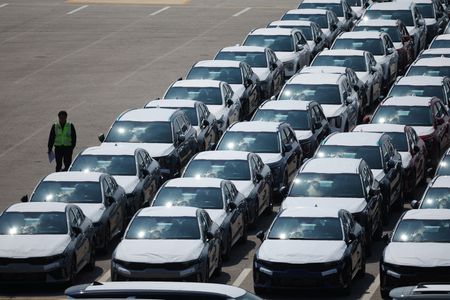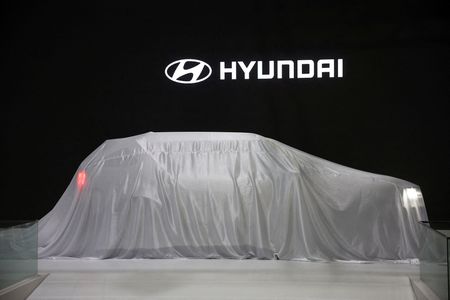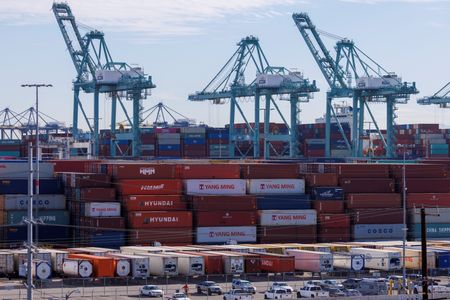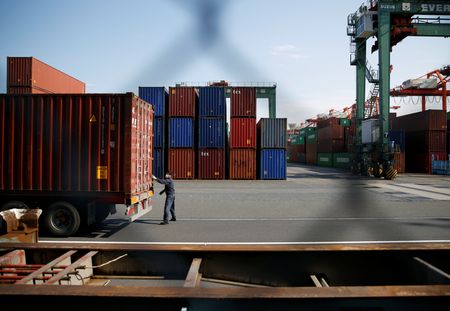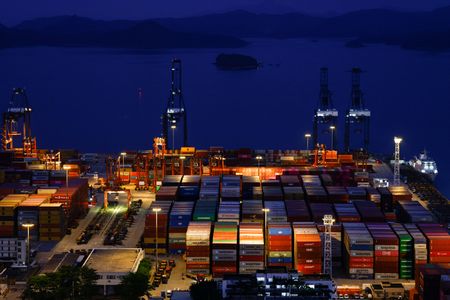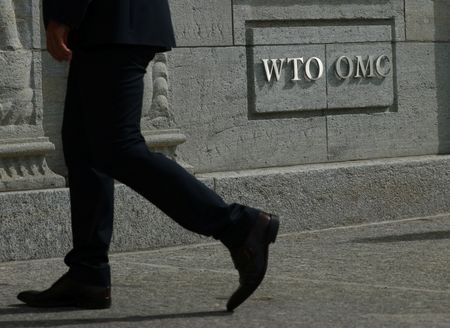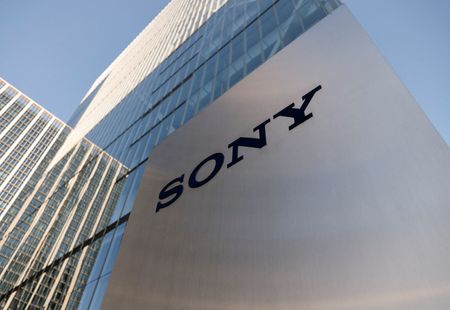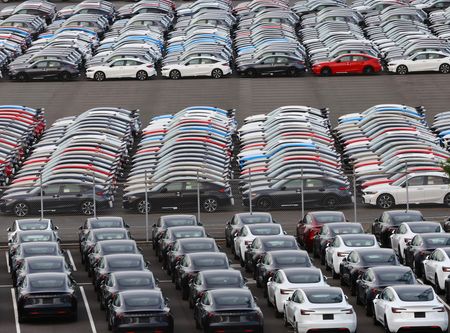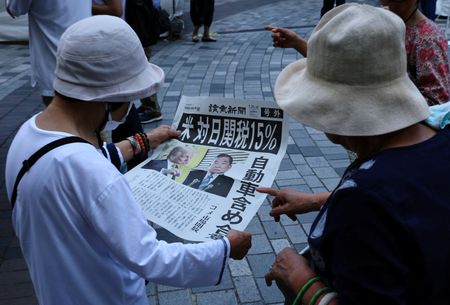By Hyunjoo Jin and David Dolan
TOKYO/SEOUL (Reuters) -Shares of Japanese, South Korean and European automakers surged on Wednesday after U.S. President Donald Trump agreed to a trade deal with Tokyo that included reducing tariffs on Japanese auto imports to 15%, a move that stoked optimism about a similar agreement for Seoul and Brussels.
Shares of Toyota, the world’s top automaker by sales, jumped more than 14% while rival Honda advanced more than 11%. The lower tariff – from as much as 27.5% previously – would ease the pain for Japan’s most important industry in a crucial market.
South Korean and European automakers gained on hopes Seoul and the European Union would be able to get a similar reprieve.
Hyundai Motor advanced more than 7% and Kia rose more than 8%.
In Europe, Volvo Car jumped 14% to the highest since May, while Porsche and Stellantis were up around 7% each.
The agreement with Japan, the world’s fourth-largest economy and a pivotal U.S. ally in Asia, is by far the most significant among several trade deals struck by the White House ahead of an August 1 deadline when higher levies are due to kick in.
Autos account for more than a quarter of Japan’s exports to the United States. Trump, who has long complained about trade imbalances with Japan, had introduced a 25% tariff on top of an already existing 2.5%, meaning autos would be hit with a total levy of 27.5%. The headline figure of 15% announced by Prime Minister Shigeru Ishiba appears to include the pre-existing 2.5%.
The new rate “would allow Japan’s beleaguered car makers to breathe a sigh of relief,” said Stefan Angrick of Moody’s Analytics in a note to clients.
In return, Japan has pledged $550 billion in U.S.-bound investment and loans. Japan will also further open up to U.S. imports of cars, rice and other goods.
“Lowering or removing trade barriers against U.S. vehicles won’t make them any easier to drive on Tokyo’s cramped streets, even if it would theoretically move the needle on Japan’s surplus with the U.S.,” Angrick said.
EASING THE PAIN
The lower tariffs would likely offer “significant upside potential” for the earnings of Japan’s seven main automakers, Goldman Sachs analysts Kota Yuzawa and Ken Kawamoto said in a note.
They estimated the gross tariff impact for the seven companies – which include Subaru, Mitsubishi Motors, Suzuki and Mazda – would be reduced to 1.89 trillion yen ($12.9 billion) from 3.47 trillion yen previously.
Citi analysts said it was notable the tariffs for a major auto exporting country were reduced without a cap on shipments, which could have implications for negotiations with the EU and South Korea.
Still, it is unlikely to be all smooth sailing for Asian automakers.
So far, tariffs from Canada and Mexico remain in place at 25%. Mexico in particular is a key production hub for European and Japanese automakers, including Nissan, and also home to a Kia factory. Nissan shares were up 8%. Stellantis manufactures around 40% of its North American vehicles in Mexico and Canada.
News of Japan’s trade deal is also likely to pile pressure on Seoul to come up with its own agreement ahead of the August 1 deadline.
Seoul is taking a close look at the U.S.-Japan deal, South Korea’s industry minister said. South Korea is a major competitor of Japan in areas such as autos and steel. It heads into high-level trade talks with the United States on Friday.
For both Japan and South Korea, the auto industry provides major exports, millions of manufacturing jobs and is a deep source of national pride.
Even with tariffs, the U.S. remains by far the most important market for Toyota, Hyundai, Honda, Nissan and others. At Toyota and Hyundai alone, North America accounts for at least 40% of the revenue, filings show.
The U.S. is Toyota’s biggest market in terms of vehicles. It sold 2.3 million vehicles there in 2024, including its Lexus brand, accounting for more than a fifth of its global total.
As a source of revenue, North America was second only to Japan in the last financial year. Meanwhile, Hyundai’s North American revenue was the highest in almost a decade last year.
It is also a key market for European automakers. Europe shipped nearly 758,000 cars worth 38.9 billion euros ($45.57 billion) to the U.S. in 2024, more than four times as many as in the other direction, according to data from European auto association ACEA.
(Reporting by Hyunjoo Jin and David Dolan, additional reporting by Anna Pruchnicka; Editing by Ed Davies, Saad Sayeed and Shri Navaratnam)

